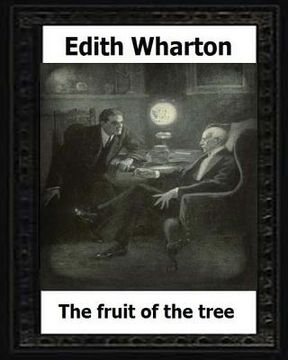Reseña del libro "The Fruit of the Tree (1907) by: Edith Wharton (en Inglés)"
The Fruit of the Tree is one of Edith Wharton's few novels to deal directly with issues such as euthanasia, the problems of labor and industrial conditions, and professions for women, as well as Wharton's more customary themes such as divorce. Published in 1907, it received positive but mixed reviews, and more recently critics have attempted to explain its uneven structure, which combines an industrial plot (Amherst's attempts to reform the mills), an ethical plot (the question of euthanasia) and the more conventional romance plot (Justine, Bessy, and Amherst). As The Fruit of the Tree opens, John Amherst, the reform-minded assistant manager at the Hanaford textile mills, meets trained nurse Justine Brent at the hospital bedside of Dillon, an injured mill worker. Justine and Amherst agree Dillon would be better off dead if he is deprived of his occupation, a conversation that unites them in their approval of euthanasia and sets in motion the novel's major incident. Shortly thereafter, Amherst is pressed into showing the mills to the new owner, Bessy Langhope Westmore, a former schoolmate of Justine's who is now a wealthy young widow with a young daughter. During the course of later meetings over the fate of the workers, Bessy falls in love with Amherst, caring less for his beautiful ideas than for his beautiful eyes. Thinking that she shares his idealistic social vision and concern for the workers, Amherst marries her and begins his campaign of reforming the mills. He runs into direct opposition from Bessy's father, Mr. Langhope, and her lawyer, Mr. Tredegar, and indirect opposition from Bessy, since all three prefer to maximize profits at the expense of the millhands. After the death of their infant son, Bessy and Amherst become increasingly estranged, and he spends longer and longer periods absent from home. In the meantime, Justine and Amherst have met and discussed conditions in the mills, and he has come to regard her as a friend. During one of his absences, which Amherst intends as a tacit separation between the two, Bessy recognizes that Amherst is drifting away from her. Hurt by his indifference, she defies his wishes by going to parties with the disreputable Mrs. Fenton Carbury and indulges herself in planning a "pleasure-house" replete with sun-room, water gardens, and other expensive features. By this time Bessy has also renewed her friendship with Justine, who tacitly understands the situation. Seeing the two drift apart and urged on by Mrs. Ansell, an older friend of Bessy's, Justine writes to Amherst that he should return home. Hurt by Amherst's refusal to do so, Bessy rides over icy roads on her spirited horse, Impulse, and suffers a near-fatal spinal injury. Called to Bessy's side in her capacity of nurse as well as friend, Justine watches Bessy suffer helplessly at the hands of Dr. Wyant, the ambitious young doctor determined to keep his patient alive at all costs. When Wyant leaves the house one afternoon, Justine faces the moral choice of whether to continue Bessy's suffering or to end it. She recalls Amherst's seeming approval of euthanasia both in the case of Dillon and in notes that he has written in his books. Moved by Bessy's plight and comforted by what she is sure will be Amherst's approval, she administers an overdose of morphine to Bessy.
Edith Wharton nació en Nueva York en 1862. Su nombre de soltera era Edith Newbold Jones. Su familia era de clase alta, comparable a la aristocracia europea, y consecuentemente recibió una esmerada educación privada. En 1907 se estableció en Francia, donde se convirtió en discípula y amiga de Henry James. Su obra más conocida es La edad de la inocencia, publicada en 1920 y ganadora del premio Pulitzer en 1921. Está considerada la más genial novelista americana de su generación, admirada por intelectuales de la talla de Henry James, Francis Scott Fitzgerald, Jean Cocteau y Ernest Hemingway.
Ver más
Ver menos

